
Valentin Sergeyevich Pavlov was a Soviet official who became a Russian banker following the dissolution of the Soviet Union. Born in the city of Moscow, then part of the Russian Soviet Federative Socialist Republic, Pavlov began his political career in the Ministry of Finance in 1959. Later, during the Brezhnev Era, he became head of the Financial Department of the State Planning Committee. Pavlov was appointed to the post of Chairman of the State Committee on Prices during the Gorbachev Era, and later became Minister of Finance in Nikolai Ryzhkov's second government. He went on to succeed Ryzhkov as head of government in the newly established post of Prime Minister of the Soviet Union.

Izvestia is a daily broadsheet newspaper in Russia. Founded in February 1917, Izvestia, which covered foreign relations, was the organ of the Supreme Soviet of the Soviet Union, disseminating official state propaganda. It is now described as a "national newspaper" of Russia.
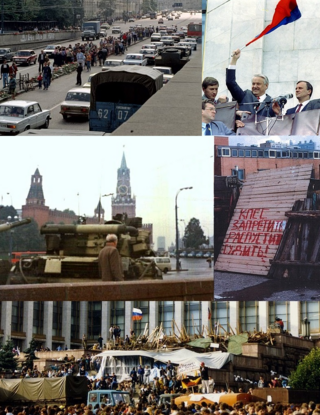
The 1991 Soviet coup d'état attempt, also known as the August Coup, was a failed attempt by hardliners of the Communist Party of the Soviet Union (CPSU) to forcibly seize control of the country from Mikhail Gorbachev, who was Soviet President and General Secretary of the CPSU at the time. The coup leaders consisted of top military and civilian officials, including Vice President Gennady Yanayev, who together formed the State Committee on the State of Emergency (GKChP). They opposed Gorbachev's reform program, were angry at the loss of control over Eastern European states and fearful of the New Union Treaty, which was on the verge of being signed by the Soviet Union (USSR). The treaty was to decentralize much of the central Soviet government's power and distribute it among its fifteen republics; Yeltsin's demand for more autonomy to the republics opened a window for the plotters to organize the coup.

Rossiyskaya Gazeta is a Russian newspaper published by the Government of Russia.

The Russian Communist Workers' Party was a communist party in Russia. It was established in November 1991 with the aim of resurrecting socialism and the Soviet Union. It published a newspaper called Trudovaya Rossiya and the journal Sovetskiy Soyuz.

Printed media in the Soviet Union, i.e., newspapers, magazines and journals, were under strict control of the CPSU and the Soviet state. The desire to disseminate propaganda was believed to had been the driving force behind the creation of the early Soviet newspapers. Newspapers were the essential means of communicating with the public, which meant that they were the most powerful way available to spread propaganda and capture the hearts of the population. Additionally, within the Soviet Union the press evolved into the messenger for the orders from the CPSU Central Committee to the party officials and activists. Due to this important role, the Soviet papers were both prestigious in the society and an effective means to control the masses; however, manipulation initially was not the only purpose of the Soviet press.
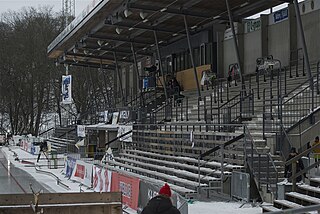
The Bandy World Championship is a competition for the men's teams of bandy-playing nations. The tournament is administrated by the Federation of International Bandy. It is distinct from the Bandy World Cup, a club competition, and from the Women's Bandy World Championship. A Youth Bandy World Championship also exists separately from the senior competition and has competitions in both the male and female categories.
RIA Novosti, sometimes referred to as RIAN (РИАН) or RIA (РИА), is a Russian state-owned domestic news agency. On 9 December 2013, by a decree of Vladimir Putin, it was liquidated and its assets and workforce were transferred to the newly created Rossiya Segodnya agency. On 8 April 2014, RIA Novosti was registered as part of the new agency.

Presidential elections were held in the Russian Soviet Federative Socialist Republic (RSFSR) on 12 June 1991. This was the first Russian presidential election in the country's history. The election was held roughly three months after Russians voted in favor of establishing a presidency and holding direct elections in a referendum held in March that year. The result was a victory for Boris Yeltsin, who received 58.6% of the vote.

Lietuvos aidas is a daily newspaper in Lithuania. It was established on September 6, 1917, by Antanas Smetona, and became the semi-official voice of the newly formed Lithuanian government. When the government evacuated from Vilnius to the temporary capital, Kaunas, it ceased publication. The newspaper was revived in 1928 as the newspaper of the Lithuanian government and became the most popular newspaper in Lithuania. At its peak, it published three daily editions with combined circulation of 90,000 copies. World War II disrupted its publication. In 1990, after Lithuania declared independence from the Soviet Union, the newspaper once again became the official newspaper of the Supreme Council of the Republic of Lithuania. At the end of 1992, its circulation reached 103,000 copies. However, it was soon privatized and faced shrinking readership, financial difficulties, and other controversies. In April 2006, bankruptcy proceedings were initiated by the State Tax Inspectorate when its tax debts reached more than 4 million litas. The company was liquidated in 2015, but the newspaper continues to be published by a non-profit organization.
Sovetskaya Latviya was a major Russian-language newspaper in the Latvian SSR.

Television, magazines, and newspapers have all been operated by both state-owned and for-profit corporations which depend on advertising, subscription, and other sales-related revenues. Even though the Constitution of Russia guarantees freedom of speech, the press has been plagued by both government censorship and self-censorship.
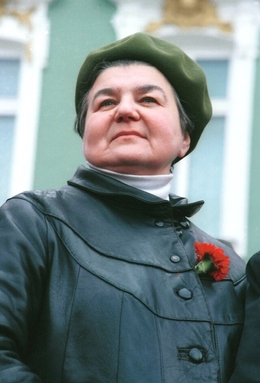
Nina Alexandrovna Andreyeva was a Soviet and Russian chemist, teacher, author, political activist, and social critic. A supporter of classical Soviet principles, she wrote an essay entitled I Cannot Forsake My Principles that defended many aspects of the traditional Soviet system, and criticized General Secretary Mikhail Gorbachev and his closest supporters for not being true communists. In the rebuke published in the official party newspaper Pravda the essay was called The Manifesto of Anti-Perestroika Forces.
"A Word to the People" was an open letter signed by twelve Soviet public figures. The declaration was published in Sovetskaya Rossiya on 23 July 1991.
Architect amidst the Ruins was an open letter by Gennady Zyuganov, then a relatively little known party functionary who later became the leader of the Communist Party of the Russian Federation, to Alexander Yakovlev, the ideological founder of perestroika who was also known as the "architect of perestroika".
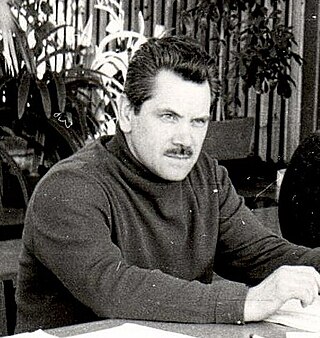
Anatoly Sergeevich Chernyaev was a Russian politician and writer, member of the Central Committee of the Communist Party of the USSR, who became foreign-policy advisor to General Secretary Mikhail Gorbachev in 1986-1991.

The Union of Soviet Socialist Republics (USSR) was formally dissolved as a sovereign state and subject of international law on 26 December 1991 by Declaration № 142-Н of the Soviet of the Republics of the Supreme Soviet of the Soviet Union. It also brought an end to the Soviet Union's federal government and General Secretary Mikhail Gorbachev's effort to reform the Soviet political and economic system in an attempt to stop a period of political stalemate and economic backslide. The Soviet Union had experienced internal stagnation and ethnic separatism. Although highly centralized until its final years, the country was made up of 15 top-level republics that served as the homelands for different ethnicities. By late 1991, amid a catastrophic political crisis, with several republics already departing the Union and Gorbachev continuing the waning of centralized power, the leaders of three of its founding members, the Russian, Belorussian, and Ukrainian SSRs, declared that the Soviet Union no longer existed. Eight more republics joined their declaration shortly thereafter. Gorbachev resigned on 25 December 1991 and what was left of the Soviet parliament voted to dissolve the union.
Russian Government Cup was a tournament for national teams in bandy, arranged in Russia every other year from 1972 until 2012. The cup has not been played since 2012.
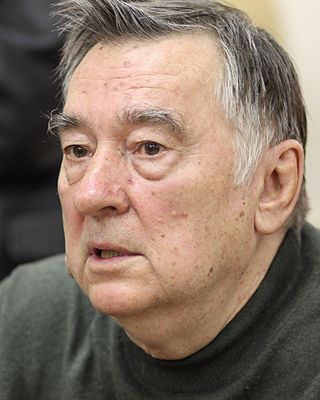
Alexander Andreyevich Prokhanov is a Russian writer, a member of the secretariat of the Writers Union of the Russian Federation, and the author of more than 30 novels and short story collections. He is the editor-in-chief of Russia's extreme-right newspaper Zavtra, that combines ultranationalist and anti-capitalist views.
Sovetskaya Litva was a Russian-language daily newspaper published in the Lithuanian SSR. In tandem with the Lithuanian-language Tiesa, it was the official newspaper of the Communist Party of Lithuania, the Supreme Soviet of the Lithuanian SSR, and the Council of Ministers of the Lithuanian SSR. After the restoration of Lithuania's independence in 1990, the newspaper became an independent daily under the name Echo Litvy. Its circulation was 79,000 copies in 1981, 26,000 copies in 1993, and 12,000 copies in 1997. It discontinued publication in 2001 due to financial difficulties.














